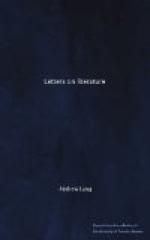Virgil, in writing the “AEneid,” executed an imperial commission, and an ungrateful commission; it is the sublime of hack-work, and the legend may be true which declares that, on his death-bed, he wished his poem burned. He could only be himself here and there, as in that earliest picture of romantic love, as some have called the story of “Dido,” not remembering, perhaps, that even here Virgil had before his mind a Greek model, that he was thinking of Apollonius Rhodius, and of Jason and Medea. He could be himself, too, in passages of reflection and description, as in the beautiful sixth book, with its picture of the under world, and its hints of mystical philosophy.
Could we choose our own heavens, there in that Elysian world might Virgil be well content to dwell, in the shadow of that fragrant laurel grove, with them who were “priests pure of life, while life was theirs, and holy singers, whose songs were worthy of Apollo.” There he might muse on his own religion and on the Divinity that dwells in, that breathes in, that is, all things and more than all. Who could wish Virgil to be one of the spirits that
Lethaeum ad flumen Dues evocat agmine magno,
that are called once more to the Lethean stream, and that once more, forgetful of their home, “into the world and wave of men depart?”
There will come no other Virgil, unless his soul, in accordance with his own philosophy, is among us to-day, crowned with years and honours, the singer of “Ulysses,” of the “Lotus Eaters,” of “Tithonus,” and “OEnone.”
So, after all, I have been enthusiastic, “maugre my head,” as Malory says, and perhaps, Lady Violet, I have shown you why it is “right” to admire Virgil, and perhaps I have persuaded nobody but myself.
P.S.—Mr. Coleridge was no great lover of Virgil, inconsistently. “If you take from Virgil his diction and metre, what do you leave him?” Yet Mr. Coleridge had defined poetry as “the best words, in the best order”—that is, “diction and metre.” He, therefore, proposed to take from Virgil his poetry, and then to ask what was left of the Poet!
AUCASSIN AND NICOLETTE
To the Lady Violet Lebas.
Dear Lady Violet,—I do not wonder that you are puzzled by the language of the first French novel. The French of “Aucassin et Nicolette” is not French after the school of Miss Pinkerton, at Chiswick. Indeed, as the little song-story has been translated into modern French by M. Bida, the painter (whose book is very scarce), I presume even the countrywomen of Aucassin find it difficult. You will not expect me to write an essay on the grammar, nor would you read it if I did. The chief thing is that “s” appears as the sign of the singular, instead of being the sign of the plural, and the nouns have cases.
The story must be as old as the end of the twelfth century, and must have received its present form in Picardy. It is written, as you see, in alternate snatches of verse and prose. The verse, which was chanted, is not rhymed as a rule, but each laisse, or screed, as in the “Chanson de Roland,” runs on the same final assonance, or vowel sound throughout.




